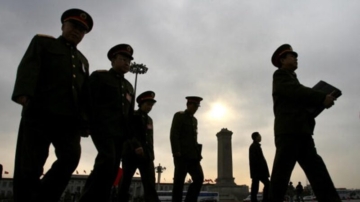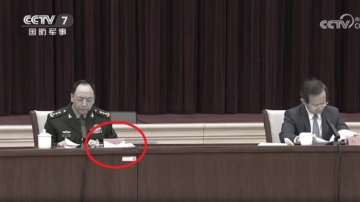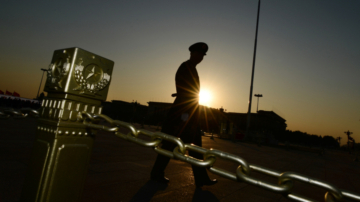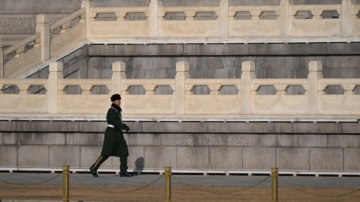【新唐人2013年03月12日訊】中共改革開放以來,政府機構已經經歷了6次較大幅度的調整。這次中共在兩會期間推行新一輪的大部制改革,被看做是「習李新政」的正式實施。整合後,國務院轄下機構將由現在的29個減少到25個,但與此同時,中共將不得不面對大部制改革後,部委「權力集中」和「過大」所帶來的新危機。
根據3月10號披露的國務院機構改革和職能轉變方案,國務院組成部門將減少4個,鐵道部、國家新聞出版總署等部委將被撤併。
《新京報》報導,在當天的小組討論會上,有記者質問國家發改委副主任杜鷹,說:發改委會不會借大部制改革擴權成「小國務院」?杜鷹承認,有關「發改委」權力過於集中的問題,可能是今後改革中需要解決的。
北京時政觀察人士華頗指出,這次大部制改革的本意是想提高行政效率,卻可能導致權力集中問題,而產生新一輪的腐敗。
北京時政觀察人士華頗:「權力集中後有一個問題就是產生腐敗,可能會促使它的衙門作風更加嚴重,因為它們權力也更加集中了。而且還有一個問題,這次大部制改革會使原有利益群體產生影響,因為在中國利益已經是部門化了。但是大部制以後,權力集中是不是使這種利益部門化的現象更加嚴重?所以利益更集中在一些少的部門手裡,又形成一種新的權力壟斷。」
也有觀點認為,大部委的權力過大,可能導致制度的權威受到挑戰,中共總書記習近平的籠子如何關住大部制改革後產生的新老虎﹖如何把權力關進制度的籠子裡﹖已經成為大部制改革後面臨的新危機。
而旅居美國的政論家伍凡分析認為,大部制改革除了想減少各部門之間的矛盾和衝突,中共當局另一個目地,可能是想清理江澤民的那些餘黨和部門。
旅美政論家伍凡:「其中一個最大的部門就是鐵道部,但是現在的結果,根據中共歷來...幾十年啦,越改部門越大,越改部門越多。現在也還是這個老套子。你把它減少了,它馬上再成立個臨時機構,臨時辦公室。」
3月10號,鐵道部部長盛光祖對媒體表示,鐵路職工不存在安置問題,都在就業崗位上,也不會裁員。
華頗:「盛光祖說不會淘汰人,它可能會以其他形式出現,可能會形成一些特殊的『金鼎』,他語言裡有千絲萬縷的意思,也許有可能會集中官商,或形成新的一批『紅頂』的商人。」
香港《太陽報》的文章直接指出,中共大部制,改來改去,騙來騙去。看似衙門減少了,實際上減位不減人,純粹是玩「障眼法」。
此外,據《京華時報》報導,中國行政體制改革研究會副會長汪玉凱表示,轉變政府職能是這次大部制改革的最大著力點,國家部委以前掌握的很多項目資金,有望轉移給地方,屆時「跑部進京」的情況有可能會逐漸減少。
但伍凡認為,中共官員們吃喝慣了,他們絕對不會輕易放棄既得利益。
伍凡:「它畢竟不是一個民主國家,它是一個專制國家,這些官員就變成了大蛀蟲了。美國的官員下來就下來了,走了就走了,與這個部門沒有關係了,他們不,他們絕對不會放棄的。」
華頗認為,賦予大部委更大權力後,除了機構更加衙門化,更加高高在上。之外,同時只會培養這些部門的懶散作風。因此,中共實施大部制的實際效果,恐怕不會理想。
而民間對於中共政府機構頻繁調整,卻不能實際解決問題,以順口溜辛辣諷刺說:「七姑八姨,裙帶繫栓。親朋故舊,血肉相連。領導親信,不能怠慢。張三有人,李四有錢。看看名單,都不簡單。裁員裁員,裁誰都難。」
採訪/朱智善 編輯/王子琦 後製/李勇
China Faces New Crisis After Reform
Since the reform and opening up in communist China,
government agencies have experienced 6 substantial changes.
During its 2 sessions, the Chinese Communist Party (CCP)
carried out a new round of reform, implementing the formal start of the new Xi-Li regime.
After integration, the number of departments under
the State Council will be reduced from 29 to 25.
Meanwhile, the CCP face the crisis of some committees
"having too much power" and "being too big".
The State Council will lose 4 of its departments on March 10
according to the State Council institutional reform and functional transformation program.
The reduction is due to a merger of the Ministry of Railways,
the State Press, the Publication Administration, and others.
http://news.163.com/13/0311/03/8PLFOER200014AED.html
Beijing News said that, on the day of the panel discussion,
a reporter had asked question to Du Ying—deputy director of National Development and Reform Commission (NDRC).
“if the reform will help NDRC become ‘a little State Council’”.
Du Ying admitted that the problem of excessive power
concentration in NDRC may need addressing in future.
Hua Po, current affairs observer in Beijing, points out that
this time most of the reform targeted administrative progress in efficiency,
however, this may lead to power concentrations
and generate a new round of corruption.
[Hua Po, Current Affairs Observer, Beijing]:
"Concentration of power leads to corruption and enhances the bureaucratic style.
Another problem is that the reform will
mostly impact the original interest groups.
In China, interests have been departmentalized
—will the concentration of power worsen this?
Thus, the interests are more concentrated in some small
departments and from a new monopoly of power."
Others believe that the ministries holding excessive power
may result in the system's authorities being challenged.
How will the CCP's new leader Xi Jinping contain
this crisis from immerging from the reform?
How will Xi's locking the power in the system
generate a new crisis from the reform?
Wu Fan, political commentator in the U.S. believes that
most of the reform aims to reduce contradictions and conflicts among various departments.
It is possible that authorities may want to use the reform
to clean up remnants of Jiang Zemin's faction.
[Wu Fan, Political Commentator, U.S.]:
"One of the largest departments is the Ministry of Railways;
decades of CCP reforms show that with each reform,
the Railways enlarges—the same trick's being played now.
You can reduce its size, but it immediately establishes
new temporary agencies and offices.
On March 10, Sheng Guangzu, the Minister of Railways,
told media that the railway employees are not being laid off and will have no resettlement issues.
[Hua Po, Current Affairs Observer, Beijing]:
“He said no one will be made redundant.
However, it may appear in other forms—his remarks
contained layers of meanings—
maybe it would be more officials and businessmen,
or in the formation of a new group of top businessmen."
http://the-sun.on.cc/cnt/news/20130311/00418_003.html
The Sun newspaper of Hong Kong published an article
directly pointing out that the CCP likes to deceive the masses
and carry out more reforms but make fewer changes—saying
reducing agencies but retaining staff was a pure cover-up.
Beijing Times reported that Wang Yukai, Vice president
of Chinese Administrative Reform said that
“the key focus of this reform” was to transform the
government's functions.
The national ministries can now transfer funding
to the local ministries, reducing the load on Beijing.
Wu Fan says, CCP officials are used to enjoying things
for free, and will not easily give up their vested interests.
[Wu Fan, Political Commentator, U.S.]:
"After all, it's not a democracy; it's a dictatorship, and these officials are big parasites.
When U.S. officials step down, they are gone and no longer
associate with the department, but Chinese officials linger and will not give up.”
Hua Po believes that giving more power to the big ministries
makes them not only more “bureaucratic” and “lofty”, but also more relaxed and lazy.
So, the actual effect of implementing the reform
will most likely not be ideal.
Chinese citizens realize that the frequent adjustments
in governmental agencies cannot actually solve problems.
Some people mockingly say: "All of them are friends or of
flesh and blood;
they are the leader's cronies and you can't
neglect them.
Looking at the list, none of them are easy to deal with
—it's so hard to eliminate anyone.
根據3月10號披露的國務院機構改革和職能轉變方案,國務院組成部門將減少4個,鐵道部、國家新聞出版總署等部委將被撤併。
《新京報》報導,在當天的小組討論會上,有記者質問國家發改委副主任杜鷹,說:發改委會不會借大部制改革擴權成「小國務院」?杜鷹承認,有關「發改委」權力過於集中的問題,可能是今後改革中需要解決的。
北京時政觀察人士華頗指出,這次大部制改革的本意是想提高行政效率,卻可能導致權力集中問題,而產生新一輪的腐敗。
北京時政觀察人士華頗:「權力集中後有一個問題就是產生腐敗,可能會促使它的衙門作風更加嚴重,因為它們權力也更加集中了。而且還有一個問題,這次大部制改革會使原有利益群體產生影響,因為在中國利益已經是部門化了。但是大部制以後,權力集中是不是使這種利益部門化的現象更加嚴重?所以利益更集中在一些少的部門手裡,又形成一種新的權力壟斷。」
也有觀點認為,大部委的權力過大,可能導致制度的權威受到挑戰,中共總書記習近平的籠子如何關住大部制改革後產生的新老虎﹖如何把權力關進制度的籠子裡﹖已經成為大部制改革後面臨的新危機。
而旅居美國的政論家伍凡分析認為,大部制改革除了想減少各部門之間的矛盾和衝突,中共當局另一個目地,可能是想清理江澤民的那些餘黨和部門。
旅美政論家伍凡:「其中一個最大的部門就是鐵道部,但是現在的結果,根據中共歷來...幾十年啦,越改部門越大,越改部門越多。現在也還是這個老套子。你把它減少了,它馬上再成立個臨時機構,臨時辦公室。」
3月10號,鐵道部部長盛光祖對媒體表示,鐵路職工不存在安置問題,都在就業崗位上,也不會裁員。
華頗:「盛光祖說不會淘汰人,它可能會以其他形式出現,可能會形成一些特殊的『金鼎』,他語言裡有千絲萬縷的意思,也許有可能會集中官商,或形成新的一批『紅頂』的商人。」
香港《太陽報》的文章直接指出,中共大部制,改來改去,騙來騙去。看似衙門減少了,實際上減位不減人,純粹是玩「障眼法」。
此外,據《京華時報》報導,中國行政體制改革研究會副會長汪玉凱表示,轉變政府職能是這次大部制改革的最大著力點,國家部委以前掌握的很多項目資金,有望轉移給地方,屆時「跑部進京」的情況有可能會逐漸減少。
但伍凡認為,中共官員們吃喝慣了,他們絕對不會輕易放棄既得利益。
伍凡:「它畢竟不是一個民主國家,它是一個專制國家,這些官員就變成了大蛀蟲了。美國的官員下來就下來了,走了就走了,與這個部門沒有關係了,他們不,他們絕對不會放棄的。」
華頗認為,賦予大部委更大權力後,除了機構更加衙門化,更加高高在上。之外,同時只會培養這些部門的懶散作風。因此,中共實施大部制的實際效果,恐怕不會理想。
而民間對於中共政府機構頻繁調整,卻不能實際解決問題,以順口溜辛辣諷刺說:「七姑八姨,裙帶繫栓。親朋故舊,血肉相連。領導親信,不能怠慢。張三有人,李四有錢。看看名單,都不簡單。裁員裁員,裁誰都難。」
採訪/朱智善 編輯/王子琦 後製/李勇
China Faces New Crisis After Reform
Since the reform and opening up in communist China,
government agencies have experienced 6 substantial changes.
During its 2 sessions, the Chinese Communist Party (CCP)
carried out a new round of reform, implementing the formal start of the new Xi-Li regime.
After integration, the number of departments under
the State Council will be reduced from 29 to 25.
Meanwhile, the CCP face the crisis of some committees
"having too much power" and "being too big".
The State Council will lose 4 of its departments on March 10
according to the State Council institutional reform and functional transformation program.
The reduction is due to a merger of the Ministry of Railways,
the State Press, the Publication Administration, and others.
http://news.163.com/13/0311/03/8PLFOER200014AED.html
Beijing News said that, on the day of the panel discussion,
a reporter had asked question to Du Ying—deputy director of National Development and Reform Commission (NDRC).
“if the reform will help NDRC become ‘a little State Council’”.
Du Ying admitted that the problem of excessive power
concentration in NDRC may need addressing in future.
Hua Po, current affairs observer in Beijing, points out that
this time most of the reform targeted administrative progress in efficiency,
however, this may lead to power concentrations
and generate a new round of corruption.
[Hua Po, Current Affairs Observer, Beijing]:
"Concentration of power leads to corruption and enhances the bureaucratic style.
Another problem is that the reform will
mostly impact the original interest groups.
In China, interests have been departmentalized
—will the concentration of power worsen this?
Thus, the interests are more concentrated in some small
departments and from a new monopoly of power."
Others believe that the ministries holding excessive power
may result in the system's authorities being challenged.
How will the CCP's new leader Xi Jinping contain
this crisis from immerging from the reform?
How will Xi's locking the power in the system
generate a new crisis from the reform?
Wu Fan, political commentator in the U.S. believes that
most of the reform aims to reduce contradictions and conflicts among various departments.
It is possible that authorities may want to use the reform
to clean up remnants of Jiang Zemin's faction.
[Wu Fan, Political Commentator, U.S.]:
"One of the largest departments is the Ministry of Railways;
decades of CCP reforms show that with each reform,
the Railways enlarges—the same trick's being played now.
You can reduce its size, but it immediately establishes
new temporary agencies and offices.
On March 10, Sheng Guangzu, the Minister of Railways,
told media that the railway employees are not being laid off and will have no resettlement issues.
[Hua Po, Current Affairs Observer, Beijing]:
“He said no one will be made redundant.
However, it may appear in other forms—his remarks
contained layers of meanings—
maybe it would be more officials and businessmen,
or in the formation of a new group of top businessmen."
http://the-sun.on.cc/cnt/news/20130311/00418_003.html
The Sun newspaper of Hong Kong published an article
directly pointing out that the CCP likes to deceive the masses
and carry out more reforms but make fewer changes—saying
reducing agencies but retaining staff was a pure cover-up.
Beijing Times reported that Wang Yukai, Vice president
of Chinese Administrative Reform said that
“the key focus of this reform” was to transform the
government's functions.
The national ministries can now transfer funding
to the local ministries, reducing the load on Beijing.
Wu Fan says, CCP officials are used to enjoying things
for free, and will not easily give up their vested interests.
[Wu Fan, Political Commentator, U.S.]:
"After all, it's not a democracy; it's a dictatorship, and these officials are big parasites.
When U.S. officials step down, they are gone and no longer
associate with the department, but Chinese officials linger and will not give up.”
Hua Po believes that giving more power to the big ministries
makes them not only more “bureaucratic” and “lofty”, but also more relaxed and lazy.
So, the actual effect of implementing the reform
will most likely not be ideal.
Chinese citizens realize that the frequent adjustments
in governmental agencies cannot actually solve problems.
Some people mockingly say: "All of them are friends or of
flesh and blood;
they are the leader's cronies and you can't
neglect them.
Looking at the list, none of them are easy to deal with
—it's so hard to eliminate anyone.







